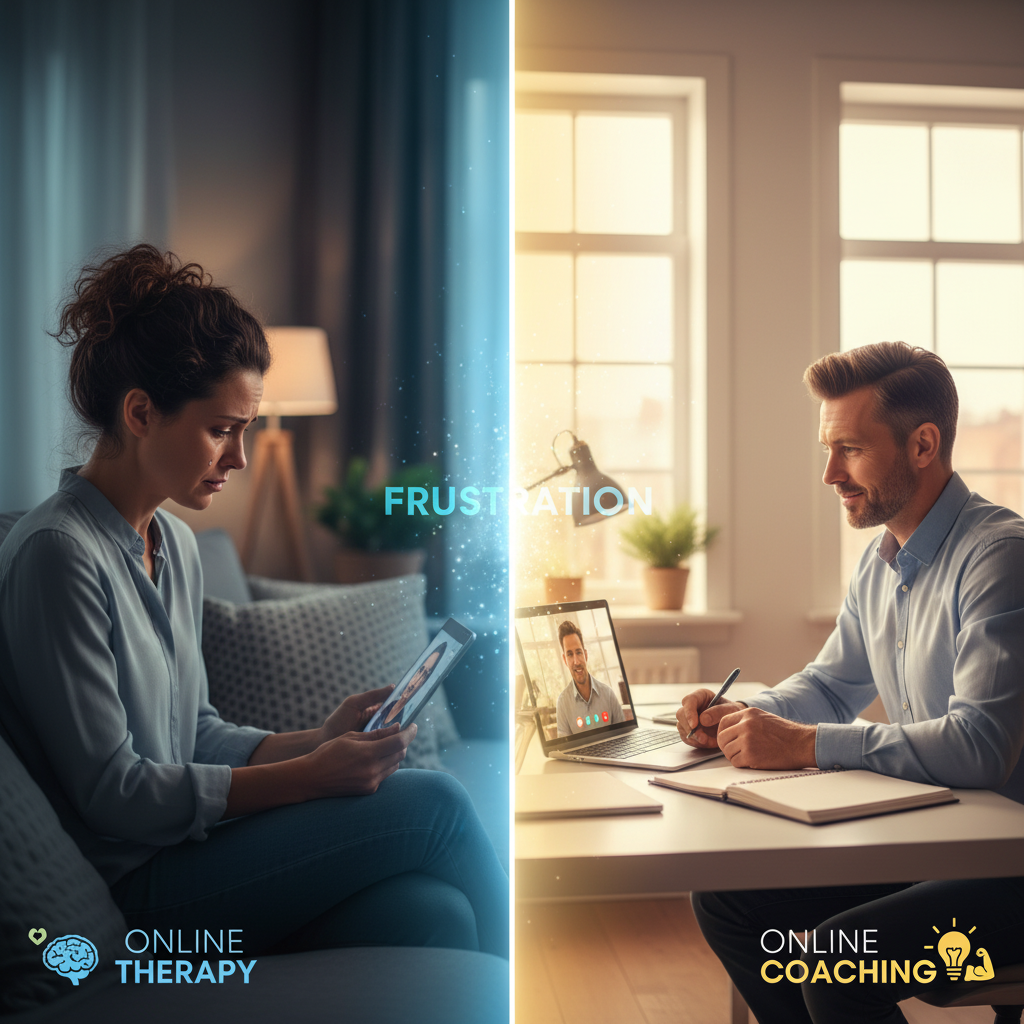Opening: The Crossroads of Frustration
That’s frustrating when you feel stuck in the same cycle—tired of overthinking, weighed down by stress, and not sure who to turn to. Do you need a therapist to help unpack deeper issues, or a coach to guide you toward action?
It’s not always obvious. I feel frustrated when I can’t tell if I should dig into the past or focus on moving forward. That’s where understanding the difference between therapy and coaching matters.
If you’ve ever felt stuck in your career or drained by family conflict, this guide will walk you through how both can support you, and which one might fit your unique situation when frustration takes over.
Using the LOWER Method to Decide
Here’s how the LOWER formula applies to choosing between therapy and coaching:
- Label: Recognize the frustration — “that’s frustrating when I can’t make progress even though I’ve tried.”
- Own: Say out loud — “I feel frustrated when I don’t know if I need healing or accountability.”
- Wait: Pause before rushing into either option.
- Explore: Compare the paths of therapy and coaching.
- Resolve: Choose the right support, start small, and commit.
Therapy: When Healing is Needed
What therapy is: Licensed mental health professionals help you work through anxiety, trauma, depression, or emotional struggles. Sessions often explore past experiences and their impact on your present. Therapy shines if your frustration comes from trauma, depression, or overwhelming stress. For example, if unresolved emotions spill over into family secrets that cause stress or relationship tension, therapy gives you tools to process and heal.
LOWER in action:
- Label: A therapist can help name hidden frustrations, like underlying anxiety.
- Own: Therapy validates the statement, “I feel frustrated when I can’t control my reactions.”
- Wait: Sessions teach coping strategies that build patience.
- Explore: Evidence-based methods like CBT and mindfulness.
- Resolve: Long-term healing and healthier patterns.
Best for: Persistent stress, overwhelming emotions, family or relationship trauma, mental health conditions.
👉 Start therapy online with BetterHelp or Online-Therapy.com. Both offer flexible scheduling and licensed professionals.
Coaching: When Forward Momentum is Key
What coaching is: Coaches focus on setting goals, creating accountability, and moving you toward results. Sessions are practical and action-oriented, often shorter-term than therapy. Coaching is perfect when your frustration comes from blocked progress. If you’ve ever felt frustrated after being denied a promotion or stagnant in your job, coaching offers structure and accountability.
LOWER in action:
- Label: A coach helps you notice patterns like procrastination or avoidance.
- Own: Together you’ll reframe “I feel frustrated when I waste time instead of acting.”
- Wait: Coaching sessions often include short reflection before action planning.
- Explore: Action steps, tools, and weekly accountability.
- Resolve: Tangible progress toward goals (career, money, personal habits).
Best for: Workplace frustration, career advancement, productivity struggles, reaching personal milestones.
👉 Explore coaching options with Coach.me or other online coaching platforms that specialize in personal growth.
Key Differences at a Glance
While therapy dives deep, coaching creates action. Both can help with workplace frustrations, but the path depends on whether you need healing or direction.
| Aspect | Therapy | Coaching |
| Focus | Past + present (healing) | Present + future (action) |
| Provider | Licensed therapist | Certified or experienced coach |
| Issues | Mental health, trauma, deep emotions | Goals, productivity, accountability |
| Timeframe | Often long-term | Often shorter-term |
| Tools | CBT, DBT, mindfulness, talk therapy | Action plans, tracking, feedback |
FAQs About Therapy vs Coaching
Q: Can I do both at the same time?
A: Yes. Many people use therapy for emotional healing while working with a coach for career or productivity.
Q: Is online therapy as effective as in-person?
A: Research shows online therapy can be equally effective for many issues, especially for stress and anxiety.
Q: Do coaches give advice like therapists?
A: Coaches guide with tools and accountability, but they don’t diagnose or treat mental health conditions.
Q: How do I know if I need therapy instead of coaching?
A: If frustration is tied to trauma, depression, or overwhelming anxiety, start with therapy. If it’s about achieving goals, coaching may be enough.
Closing: Resolve Your Next Step
You don’t have to stay stuck at the crossroads of frustration. The important thing is to take one step toward support—whether that’s a therapist helping you untangle deep emotions, or a coach giving you the structure to move forward.
👉 If you’re leaning toward healing, try BetterHelp or Online-Therapy.com.
👉 If you want accountability and results, explore Coach.me today.
The LOWER method reminds us that frustration isn’t the end of the road—it’s a signal. By labeling it, owning it, waiting, exploring, and resolving, you’ll find the right partner to help you walk through it.





Leave a Reply